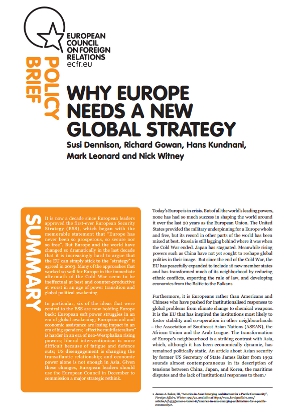Why Europe can’t leave Asia to the US
Can Europeans safely ignore rising tensions in the Asia-Pacific? European policymakers may want to focus on their near neighbourhood and the transatlantic relationship but one way or the other they will have to deal with the fallout from rising tensions in Asia.
 Can Europeans safely ignore rising tensions in the Asia-Pacific? Many in Europe now argue that, in the context of economic crisis and the US “pivot” to Asia, the European Union’s beleaguered member states should narrow their strategic focus to their troubled neighbourhood. If the EU can get a grip on North Africa and balance Russia in Ukraine, so the argument goes, it will in turn revitalize both the EU’s multilateral and transatlantic relationships. The implication is that Europe can remain immune from strategic developments in the Asia, where it should pursue almost entirely economic goals.
Can Europeans safely ignore rising tensions in the Asia-Pacific? Many in Europe now argue that, in the context of economic crisis and the US “pivot” to Asia, the European Union’s beleaguered member states should narrow their strategic focus to their troubled neighbourhood. If the EU can get a grip on North Africa and balance Russia in Ukraine, so the argument goes, it will in turn revitalize both the EU’s multilateral and transatlantic relationships. The implication is that Europe can remain immune from strategic developments in the Asia, where it should pursue almost entirely economic goals.
But the idea that the EU can, in effect, become a strategic player in its back yard while detaching itself from strategic affairs in the Asia-Pacific region – the new fulcrum of international politics – rests on two mistakes. The first is to believe is that Europe’s relationship with the United States will not be affected by the emerging strategic competition between China and the US. The second is to assume that this strategic competition will be geographically limited to Asia. China, in particular, has increasingly significant leverage much closer to home.
The strategic competition between China and the US could easily lead to a confrontation, though because of the interdependence between them, they are keen to avoid it. It is highly improbable that any such confrontation would involve any direct European participation, although France insists that will continue to have a military role in the Asia-Pacific and the UK would presumably be indirectly implicated with the US in any conflict due to their intelligence partnership. But, as Daniel Keohane has argued, the primary European response to China’s build-up of military capabilities in the last decade and growing tensions in the Pacific in the last few years has been apathy – “partly due to the fact that Europeans have mainly tended to seek markets rather than enemies in East Asia”.
If there were to be a confrontation between China and the US, for example in the South China Sea, it would be almost impossible for European countries not to take some sort of political stance. Increased European economic dependence on China – and especially the emergence of a “special relationship” between Beijing and Berlin – could endanger transatlantic co-ordination during a Sino-American clash. Although it is hard to envisage Europeans actively taking China’s side in such an eventuality, it is certainly conceivable that the EU could split over how to respond – or adopt a position of nervous neutralism. In either scenario, the US would view Europe’s vacillations as a profound betrayal.
Beijing would also be able to send Europe some very clear political signals in the event of such a clash. China’s global reach has expanded phenomenally over the last decade and its policy choices no longer affect only its neighbourhood but every issue and every region from Africa to the Middle East. Beijing has offered financial assistance to states from Belarus to the Democratic Republic of Congo, frequently undercutting EU efforts to promote stability and good governance. It has stood solidly by the Syrian and Iranian regimes, further complicating European diplomacy.
Its leverage even extends to Europe itself. As François Godement and Jonas Parello-Plesner highlighted in 2011, China is “exploiting Europe’s soft underbelly” by investing and buying up assets in cash-strapped countries such as Greece, Italy, Portugal and Spain – and even the UK. It has managed to create rifts within the EU over trade and financial issues, as the recent spat over solar panels demonstrated.
If friction grows between China and the US in Asia, Beijing is unlikely to treat the EU as neutral territory. Instead it is likely to coax or strong-arm its economic partners and clients in Europe to lobby Washington to back down. Even if the US and China avoid an all-out confrontation, the EU would be left looking strategically confused. At a minimum this confusion could stop the EU translating increased strategic activism in its own neighbourhood into a more consistent place on the global stage. In other words, whether Europe likes it or not, its strategic identity will be affected by what happens in Asia.
However much European policymakers may want to focus on their near neighbourhood and the transatlantic relationship, they will, one way or the other, have to deal with the fallout from rising tensions in Asia. The US is increasingly likely to judge its strategic partners, including longstanding Western allies, on their approach to China; Beijing, meanwhile, can use its economic leverage in Europe to constrain the EU in a crisis. Some of the hardest strategic choices Europe will face, therefore, will be about how to handle Beijing and balance good relations with China and the US. Even a deliberately parochial EU that disavows strategic ambitions in Asia will be vulnerable to the effects of great-power politics in the Pacific.
The European Council on Foreign Relations does not take collective positions. ECFR publications only represent the views of their individual authors.


